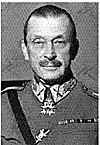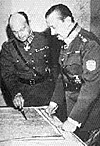 Gustaf Mannerheim was born at Louhisaari Manor
in Askainen 4 June 1867 as the third child of Count Carl
Robert Mannerheim and his wife, Helena von Julin. At
the age of fourteen he was sent to the Military Cadet
School in Hamina. Gustaf was expelled from his school
for disciplinary reasons. After passing the matriculation
examination in 1887 he decided to enter the military
profession in the Russian army and enrolled at the
Nikolaevsky Cavalry School in St. Petersburg. He first
served in the Alexandrijski Dragoons, a regiment
quartered in Poland, but was transferred after a couple of
years to the Chevalier Guards of the Empress in St.
Petersburg.
Gustaf Mannerheim was born at Louhisaari Manor
in Askainen 4 June 1867 as the third child of Count Carl
Robert Mannerheim and his wife, Helena von Julin. At
the age of fourteen he was sent to the Military Cadet
School in Hamina. Gustaf was expelled from his school
for disciplinary reasons. After passing the matriculation
examination in 1887 he decided to enter the military
profession in the Russian army and enrolled at the
Nikolaevsky Cavalry School in St. Petersburg. He first
served in the Alexandrijski Dragoons, a regiment
quartered in Poland, but was transferred after a couple of
years to the Chevalier Guards of the Empress in St.
Petersburg.
Mannerheim took part in the Russo-Japanese war of 1904-05 as a staff officer in the Nezhinski Dargoon Regiment and was promoted to colonel in the battlefield. The following year the General Staff offered him a special commission which meant travelling on horseback over 14,000 km (8,700 miles) from Russian Turkestan to Beijing, China. The journey took two years. In addition to his military mission, Mannerheim obtained scientific material and information for the Finnish National Museum as well as for the Finno-Ugrian Society.
In 1911 Mannerheim was promoted to the rank of Major General and given command of the Emperor's Uhlans of the Guard stationed in Warsaw. He enjoyed this position, although he was a Russian general, the Polish aristocracy was hospitable to him. During the First World War Mannerheim first led operations against the Austrians as commander of a brigade and later the 12th Cavalry division. In 1914 Mannerheim was awarded the Cross of St George, the highest military award in Russia. He became Lieutenant-General and during the last phase of the war was given command of the 6th Cavalry Corps on the southern front.
The Russian revolution ended his career in the Emperor's army and in December 1917 he returned to Finland. Mannerheim returned to a country which had recently declared its independence, but was torn by revolutionary disturbances and with 40,000 Russian troops still in the country. The Finnish Senate gave Mannerheim the task of forming an army and restoring law and order in the country. At the same time as Mannerheim's troops were disarming the Russian garrisons in the north the revolutionary Red Guards seized power in the south. The three-month long Civil War ended with the victory of Mannerheim's White Army in May 1918.
After and partly during the war, relations between Mannerheim and the Senate gradually became tense as the Commander-in-Chief did not approve of the Senate's pro-German policy. Mannerheim could foresee the trouble Finland, whose independence was not yet generally acknowledged, would face by being too friendly with Germany, which was losing the war. Owing to the Senate's mistrust, Mannerheim resigned and went abroad where, despite his unofficial position, he was able to influence the politics of the winning countries especially France and England, towards Finland. When Germany finally collapsed, the situation in Finland changed and Mannerheim was called back in December 1918 to act as Regent. In Finland's first presidential election the following summer, he lost, however to K.J. Ståhlberg. Mannerheim signed the constitution of the Republic of Finland in July 1919.
Mannerheim tried to make Finland participate in the Russian counter-revolutionary military intervention operations, but retired to private life after the attempts failed. During the following years Mannerheim worked for the Red Cross in Finland and for the Mannerheim League for Child Welfare, which he had founded in 1920. In 1931 he was appointed Chairman for the Defence Council. In 1933 Mannerheim was awarded the title of Field Marshal, and in 1942 he was named Marshal of Finland.
War broke out in November 1939 as the USSR started bombing Finnish cities. Mannerheim was appointed Commander-in-Chief of the Armed Forces, a position which he held during the Winter War (1939-40) and the Continuation War (1941-44).
 Mannerheim decision making in 1944.
Mannerheim decision making in 1944.
Mannerheim did not lead only military operations. His activities were also political. His purpose was to prevent Finland from getting too involved in German politics and military aims which would have been against Finland's interests. At the same time, collaboration between the army and various parties at the home front during the extended war was greatly dependent on Mannerheim's personal prestige, and in the end it was left for him to detach Finland from the war.
Towards the end of the war the Parliament appointed Mannerheim President of the Republic. He was able to lead Finland out of the war as the sole country on the losing side that was not occupied by foreign troops. In 1946 Mannerheim resigned his presidency owing to ill health. His last years he spent quietly, mainly in Switzerland, where he died in 1951 at the age of 83.
More Finland Continuation War 1941-45
- Introduction
1941: Co-Belligerence in the North
1941: The Karelian Army Advances
1942: Motion Is Not Progress
1943: The Turn of an Unfriendly Card
1944: The End of the Continuation War
Conclusion
Expatriate Soldiers
Mannerheim: Marshal of Finland
Finland: Jumbo Map of Operations
Back to Cry Havoc #30 Table of Contents
Back to Cry Havoc List of Issues
Back to MagWeb Master Magazine List
© Copyright 2000 by David W. Tschanz.
This article appears in MagWeb (Magazine Web) on the Internet World Wide Web. Other military history articles and gaming articles are available at http://www.magweb.com